Read the passage carefully and choose the correct answer.
Every country has its own tradition when New Year comes. In Japan, at midnight on December 31, all temples in the country ring their bell 108 times. They believe that the ringing bells can remove their bad actions from the previous year.
In Thai Lan, the New Year is in April. It’s the hottest time of the year. People often throw water over the people. They believe that this activity will bring a lot of rain and wash away the bad things.
In Viet Nam, people clean and decorate their houses before Tet. They would like their houses to look more beautiful. The first footer is very important. They believe that the first footer on the first New Year Day decides the family’s luck for the whole year.
Một số từ vựng:
- tradition (n): truyền thống
- ring the bell: rung chuông
- wash away: rửa sạch, cuốn trôi
- luck (n): điều may mắn
Read the passage carefully and choose the correct answer.
Every country has its own tradition when New Year comes. In Japan, at midnight on December 31, all temples in the country ring their bell 108 times. They believe that the ringing bells can remove their bad actions from the previous year.
In Thai Lan, the New Year is in April. It’s the hottest time of the year. People often throw water over the people. They believe that this activity will bring a lot of rain and wash away the bad things.
In Viet Nam, people clean and decorate their houses before Tet. They would like their houses to look more beautiful. The first footer is very important. They believe that the first footer on the first New Year Day decides the family’s luck for the whole year.
Một số từ vựng:
- tradition (n): truyền thống
- ring the bell: rung chuông
- wash away: rửa sạch, cuốn trôi
- luck (n): điều may mắn
People in Thai Lan believe that throwing water over other people will _____ and wash away the bad things.
People in Thai Lan believe that throwing water over other people will _____ and wash away the bad things.
not bring a lot of rain
brings a lot of rain
bring a lot of rain
x
Đáp án: C
Thông tin: “They believe that this activity will bring a lot of rain and wash away the bad things.”
Người Thái Lan tin rằng ném nước vào người khác sẽ _____ và rửa sạch được những điều xấu.
A. không mang đến nhiều mưa
B. mang lại nhiều mưa ( sai vì sau 'will' + V-infi)
C. mang lại nhiều mưa
Thông tin: They believe that this activity will bring a lot of rain and wash away the bad things.
(Họ tin rằng hoạt động này sẽ mang lại nhiều mưa và cuốn trôi những điều xấu.)

People in Japan believe that 108 times of ringing bell can remove their _______ from the previous year.
People in Japan believe that 108 times of ringing bell can remove their _______ from the previous year.
good actions
rude actions
bad actions
x
Đáp án: C
Thông tin: “They believe that the ringing bells can remove their bad actions from the previous year.”
Người Nhật tin rằng 108 lần chuông rung có thể xua đuổi được _________ từ những năm trước.
A. hành động tốt
B. hành động thô lỗ
C. hành động xấu
Thông tin: They believe that the ringing bells can remove their bad actions from the previous year.
(Họ tin rằng tiếng chuông có thể loại bỏ những hành động xấu của họ từ năm trước.)
April is _______ time of the year in Thai Lan.
April is _______ time of the year in Thai Lan.
hot
the hottest
hottest
x
Đáp án: B
Thông tin:
In Thai Lan, the New Year is in April. It’s the hottest time of the year.
Tháng Tư là khoảng thời gian ____ trong năm ở Thái Lan.
A. nóng
B. nóng nhất
C. sai (thiếu 'the')
Thông tin: In Thai Lan, the New Year is in April. It’s the hottest time of the year.
(Ở Thái Lan, năm mới đến vào tháng tư. Đó là thời điểm nóng nhất trong năm.)
What do Vietnamese people often do before Tet?
What do Vietnamese people often do before Tet?
visit relatives
clean and decorate their house
throw water over the people
x
Đáp án: B
Thông tin: “In Viet Nam, people clean and decorate their houses before Tet.”
Người Việt làm gì trước ngày Tết?
A. thăm họ hàng
B. dọn dẹp và trang trí nhà của họ
C. hất nước vào mọi người
Thông tin: In Viet Nam, people clean and decorate their houses before Tet.
(Ở Việt Nam, người ta dọn dẹp và trang trí nhà cửa trước Tết.)
The first people who comes to someones house on the first day are called _______.
The first people who comes to someones house on the first day are called _______.
first comer
the first
the first footer
x
Đáp án: C
- Tìm từ mang nghĩa người xông nhà (người đầu tiên vào nhà trong ngày đầu năm mới)
Người đầu tiên bước vào nhà người khác trong ngày đầu tiên được gọi là người xông nhà (the first footer).
Thông tin: They believe that the first footer on the first New Year Day decides the family’s luck for the whole year.
(Họ tin rằng người xông nhà rất quan trọng trong ngày đầu tiên của năm mới vì người xông nhà sẽ quyết định vận may trong cả năm.)
Mỗi quốc gia có truyền thống riêng của mình để đón năm mới. Tại Nhật Bản, vào nửa đêm ngày 31 tháng 12, tất cả các ngôi đền trong cả nước đều rung chuông 108 lần. Họ tin rằng tiếng chuông có thể loại bỏ những hành động xấu của họ từ năm trước.
Ở Thái Lan, năm mới đến vào tháng tư. Đó là thời điểm nóng nhất trong năm. Người ta thường ném nước lên người. Họ tin rằng hoạt động này sẽ mang lại nhiều mưa và cuốn trôi những điều xấu.
Ở Việt Nam, người ta dọn dẹp và trang trí nhà cửa trước Tết. Họ muốn ngôi nhà của họ trông đẹp hơn. Bước chân đầu tiên là rất quan trọng. Họ tin rằng bước chân đầu tiên vào ngày đầu năm mới quyết định vận may của gia đình trong cả năm.

Các bài tập cùng chuyên đề
Happy New Year!
(Chúc mừng năm mới!)
1. Listen and repeat.
(Nghe và lặp lại.)
Linda: Phong, does Viet Nam celebrate New Years?
Phong: Yes, we do. We have Tet.
Linda: When is Tet?
Phong: At different times. This year, it's in January
Linda: What do you do at Tet?
Phong: We clean our homes and decorate them with flowers.
Linda: Is Tet a time for family gatherings?
Phong: Yes. It's a happy time for everybody.
Linda: Great.
Phong: Yes, and another good thing about Tet is that children get lucky money.
Linda: That sounds interesting. Is there anything special people should do?
Phong: We should say "Happy New Year" when we meet people, and we shouldn't break anything.
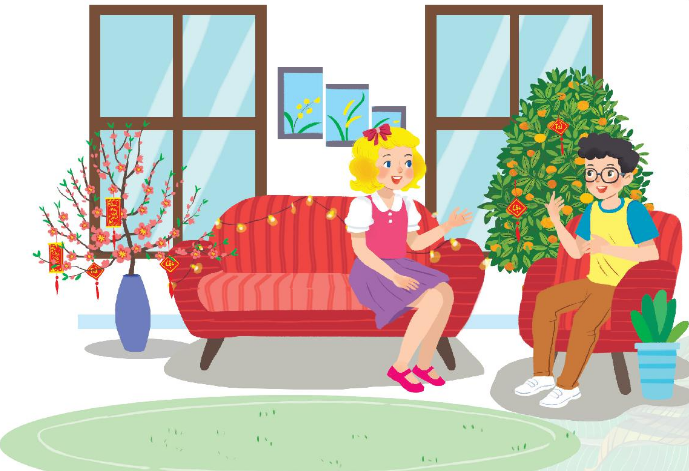
2. What are Phong and Linda talking about?
(Phong và Linda đang nói về cái gì?)
A. New year in the world
(Năm mới trên thế giới)
B. Tet in Viet Nam
(Tết ở Việt Nam)
C. What to eat and wear during Tet
(Nên ăn gì và mặc gì vào ngày Tết)
3. Complete the sentences about Tet with the information from the conversation in 1.
(Hoàn thành các câu về tết với thông tin từ bài hội thoại ở hoạt động 1.)
1. This year Tet is in____________.
2. We decorate our____________.
3. Tet is a time for family____________.
4. Children get____________ ____________.
5. People shouldn’t ____________ anything.
New Year practices in the world
(Các tập tục trong Năm mới trên thế giới)
3. QUIZ: Match the sentences with the pictures. Then match them with the countries.
(Câu đố: Nối các câu với ảnh tương ứng. Sau đó nối chúng với quốc gia tương ứng.)
1. They go to Times Square to watch the New Year's Eve Ball drop.
(Họ đến Quảng trường Thời đại để xem Vũ hội đêm giao thừa.)
2. They bathe in an ice hole.
(Họ tắm trong một hố băng.)
3. They eat mochi rice cakes.
(Họ ăn bánh gạo mochi.)
4. They throw water on other people.
(Họ tạt nước vào người khác.)
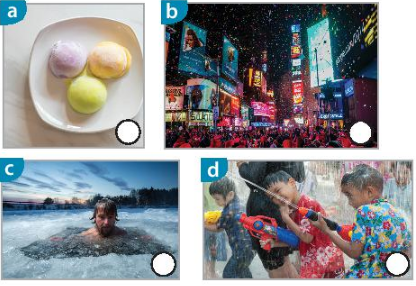
| Thailand Japan The USA Russia |
4. Read how people in different countries celebrate their New Years. Then match the countries with the activities.
(Đọc về cách mọi người ở những quốc gia khác nhau tổ chức năm mới. Sau đó nối các quốc gia với các hoạt động.)
In Japan, temples ring their bells 108 times at midnight on December 31. By doing so, people believe the bad things of the past year will leave.
In Spain, people try to put 12 grapes in their mouth at midnight for good luck.
In Switzerland, they drop ice cream on the floor to celebrate the New Year.
In Romania, they throw coins into a river for good luck.
In Thailand, they throw water on other people to wash away bad luck.
|
Countries |
Activities |
|
1. Japan 2. Spain 3. Switzerland 4. Romania 5. Thailand |
a. put 12 grapes in the mouth b. ring bells 108 times c. throw coins into a river d. throw water on other people e. drop ice cream on the floor |
5. Work in groups. Each student chooses one activity from 4. Take turns to say them aloud. The group says which country he/ she is talking about.
(Làm việc theo nhóm. Mỗi học sinh chọn 1 hoạt động từ bài 4. Lần lượt nói to chúng lên. Cả nhóm nói bạn đó đang nói về quốc gia nào.)
Example: (Ví dụ: )
- They throw water on other people.
(Họ ném nước vào người khác.)
- It's Thailand.
(Đó là Thái Lan.)
Reading
1. Reading the passages and decide who says sentences 1-5.
(Đọc các đoạn văn và quyết định ai nói các câu 1-5.)
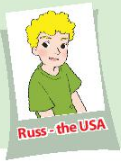
I often go to Times Square with my parents to welcome the New Year. When the clock strikes midnight, colourful fireworks light up the sky. Everybody cheers and sings.
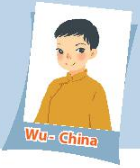
On New Year's Day, we dress beautifully and go to our grandparents' houses. We wish them Happy New Year and they give us lucky money. Then we go out and have a day full of fun.
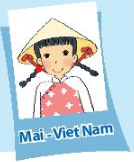
I learn some customs about Tet from my parents. People give rice to wish for enough food and buy salt to wish for good luck. Dogs are lucky animals but cats are not. A cat's cry sounds like "poor" in Vietnamese.
| A. Russ B. Wu C. Mai |
|
Statements |
Who |
|
1. Dogs are lucky animals. 2. We welcome the New Year at Times Square. 3. Children get lucky money. 4. We give rice to wish for enough food. 5. Children dress beautifully. |
C |
2. Test your memmory!
Tick (✓) the things which appear in the passages and cross (x) the ones which don't.
(Kiểm tra khả năng nhớ của em! Đánh dấu (✓) sự việc xuất hiện trong bài đọc và đánh dấu (x) cho sự việc không xuất hiện trong bài đọc.)
|
a. lucky money |
|
b. a day full of fun |
|
|
c. a cat's cry |
|
d. decorating the house |
|
|
e. fireworks |
|
f. saying wishes |
|
|
g. cheering and singing |
|
h. visiting relatives |
|
1. Match the New Year activities with the countries in the box. Make a guess if you don’t know.
(Ghép các hoạt động năm mới với các quốc gia trong hộp. Hãy đoán nếu bạn không biết.)
|
Scotland the USA Chile Denmark Thailand Korea |
In which country do people ….?
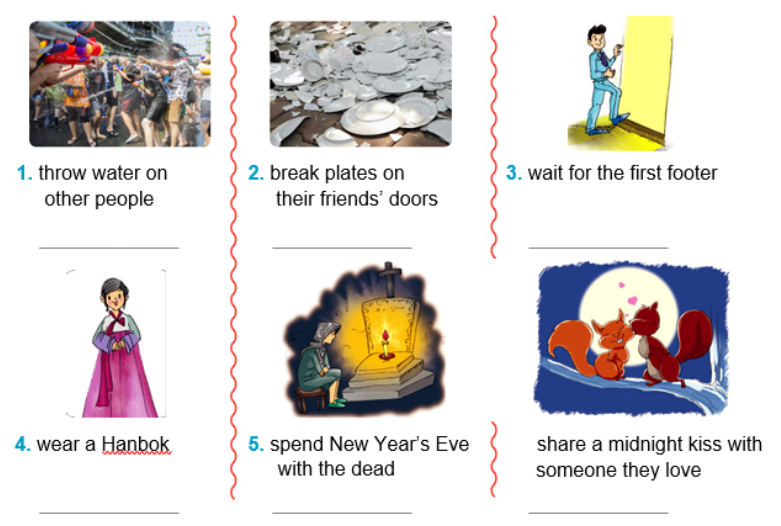
2. Read about strange New Year’s practices in some countries. Then tick T (True) or F (False).
(Đọc về các phong tục đón năm mới kỳ lạ ở một số quốc gia. Sau đó đánh dấu vào T (Đúng) hoặc F (Sai).)
|
Denmark – Some people have a loud way of celebrating the New Year. They throw plates on their friends’ doors. The people with many dishes outside their doors feel proud because they have a lot of friends. The USA – It’s a tradition in America to share a midnight kiss with someone you love. This will make the coming year beautiful and full of love for you. Chile – In Chile people participate in a mass on New Year’s Eve. Then they go to the graveyard, sit on their chairs and wait for the New Year with the dead. Korea – On New Year’s days, children wear a Hanbok, a traditional Korean dress, make one bow to their elders and wish them a long and healthy life. In return, they receive advice and some money. |
|
T |
F |
|
|
1. The Americans exchange a midnight kiss with someone they love. |
||
|
2. Korean elders bow to their children. |
||
|
3. In Chile, people welcome the New Year with the dead. |
||
|
4. Korean children make three bows to their elders. |
||
|
5. In Denmark, people celebrate the New Year quietly. |
3. Read the passages again and complete the sentences with the words / phrases given in the box.
(Đọc lại các đoạn văn và hoàn thành các câu với các từ / cụm từ cho sẵn trong hộp.)
|
midnight kiss children Chileans break Hanbok |
1. The ______________ go to the graveyard on New Year’s Eve.
2. A ______________ will bring a New Year full of love.
3. The Danish ______________ plates on their friends’ doors at the New Year.
4. Korean children wear a ______________ at the New Year.
5. The Korean elders give their ______________ advice and some money.
2. Fill each blank with one suitable word from the box to complete the passage below.
(Điền vào mỗi chỗ trống bằng một từ thích hợp từ ô trống để hoàn thành đoạn văn dưới đây.)
|
at wish will festivals rarely if from last dress until |
New Year is one of the four important traditional (1)______ in the United States. On New Year's Eve, most people go to parties. At twelve o'clock (2)______ night, everyone says "Happy NewYear!" and they (3) ______their friends and relatives good luck. New Year's parties usually (4) ______a long time. Some people don't go home (5) ______morning. Another holiday, Halloween, is mainly for children. On this holiday children (6) ______as witches, ghosts or other characters. Most of the children go (7)______ house to house and say 'Trick or Treat". (8)______ the people at the house do not give them candy, the children (9)______ play a trick on them. But this (10) ______happens. Most people give them candy or fruit.






